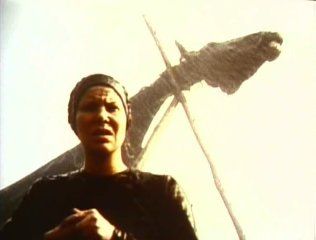Why must women bear so much?


With both Pasolini's Medea and Lars von Trier's Nymph()maniac fresh in my mind, the time seemed ripe to check out von Trier's own adaptation of the Euripides play since, like Nymph()maniac's Joe, Medea uses sex as a weapon and destroys the lives of a number of people with it. Made for Danish television in 1988 and based on an unproduced screenplay by Carl Theodor Dreyer, von Trier's Medea is awash in water imagery, bookended by scenes of the title character (Kirsten Olesen) waiting patiently for the tide to come in. As the film opens, Medea is already on the outs with her husband Jason (Udo Kier), who has thoughtlessly tossed her aside in favor of a match with Glauce (Ludmilla Glinska), daughter of the King of Corinth (Henning Jensen), who finds himself in the unenviable position of having to exile a woman whose power he fears (and rightly so) and her two children.
Visually, the film falls somewhere between Epidemic's grainy monochrome and the low-res video of The Kingdom, while also serving as a dry run for Europa's heady mix of rear projection and location shooting. It even contains echoes of the Pasolini film (e.g. a shot of Jason looking out a tall window recalls a similar one of Maria Callas as Medea) that may or may not have been intentional on von Trier's part. Whatever the case, he comes up with some striking parallels within his own film, such as the scene where Jason is separated from Glauce (whose name, he notes, means "nymph") on their wedding night by a billowing sheet that is mirrored by a later one where he grasps Medea's hand through the frame of a loom she's working on. Then there's the sail that is unfurled right in front of the camera, blocking Medea from view when she hitches a lift with the King of Athens (Baard Owe, who had previously starred in Dreyer's Gertrud), having completed her business in Corinth. You have to hand it to her: she's definitely thorough.